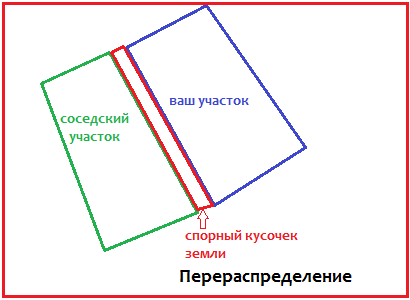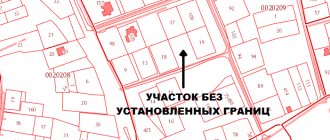The provision of land plots for personal use, for construction, for the purpose of subsequent development of the territory, for rent, for privatization and for any other purposes is regulated by the Land Code of the Russian Federation. The plot can be transferred to an individual or legal entity after an auction or without transferring the land to an auction, in cases where, according to the law, it is possible to transfer a land plot without additional procedures. If a self-government body or a leading legal entity refuses to provide an allotment, it is possible to appeal the refusal decision in court.
Cases when the decision is not subject to appeal
The Land Code of the Russian Federation provides for a number of legal grounds for preventing the acquisition of land in the presence of certain circumstances. The decision to refuse cannot be appealed in the following cases:
- If an official ban on privatization is imposed on the required territory;
- If the site contains the property of other persons or is owned by other persons;
- If there is unfinished construction on the land, carried out legally;
- When the plot was withdrawn from general circulation;
- If the plot is recognized as indivisible and belongs to the shared ownership of several individuals or legal entities;
- When the territory belongs to state reserve areas;
In the case of submitting several applications for the same plot, applicants may receive a refusal-deferment until the auction is held. In this case, one of the auction participants receives the right to receive the allotment; the rest are refused due to the results of the auction.
When refusal to provide a plot is considered illegal
A refusal is considered illegal if it is not confirmed by relevant facts indicating the impossibility of transferring the land for use. The decision to refuse can be appealed in court if the land plot is not put up for auction, does not have unfinished buildings on its territory, or has buildings, but they were built on illegal grounds. Land previously issued for personal use is subject to appeal if the right to privatization is denied, as well as refusals for plots for which the boundaries of the unused territory and its location are not determined are subject to appeal. It is considered illegal to refuse to provide a site under the pretext of prohibiting factors in the forms of use of the site by the applicant, if these factors are not documented. The same applies to lands reserved for municipal purposes if documentation of the reservation is not available.
The difficult point in the struggle for the provision of a land plot is that there are no clear rules for this procedure; for this reason, first of all, you should familiarize yourself with the legislative acts regarding the preferred plot, fill out the application correctly, and in case of refusal, try to resolve the land issue in court, which is virtually impossible to do without the help of specialists.
Statistics from our company show that more than 83% of plaintiffs win such land disputes and the decisions of the authorities that refused to issue a plot are considered illegal. In order not to face the problem of refusal from representatives of self-government bodies, it is better to entrust the procedure for obtaining an allotment or challenging it to a qualified specialist. Our company has helped hundreds of people defend the right to receive a plot of land and has extensive experience in resolving land issues of any complexity.
Land lawyer Tatyana Skvortsova
tel. WhatsApp 8-908-080-00-35
Redistribution of land plots with state lands and reasons for refusal to redistribute
Redistribution of a land plot, in other words, the opportunity to “attach” a small empty piece of land to your plot without bidding, is an exception to the general rule that land is provided at auction.
This exception was invented in order to introduce into economic circulation unused areas that are so small or have such a configuration that they do not represent independent economic value.
Who can insist on redistribution of the site?
Not every right holder can claim to enlarge his plot at the expense of empty neighboring lands.
The law (namely, Article 39.28 of the Land Code of the Russian Federation) provides four grounds for redistribution, but in real life only two of them are used.
- for citizens - owners of plots provided for individual residential buildings, gardening, vegetable gardening or personal subsidiary plots;
- for other persons (including organizations), if, as a result of redistribution, the boundaries of their site will be brought into conformity with the approved land surveying project.
Redistribution procedure:
The procedure for redistributing privately owned land with state or municipal lands is described in Art. 39.29 of the Land Code of the Russian Federation. It involves the following stages:
1) Submitting an application for redistribution (most often such an application is submitted to the administration of the city district or municipal district on the territory of which the site is located). The application is accompanied by a diagram of the site that is planned to be formed as a result of redistribution. If the redistribution is carried out on the basis of a land surveying project, then the diagram does not need to be attached, but the details of the land surveying project must be indicated.
2) Within 30 days, the administration must:
- — approve the attached diagram (if there is no land surveying project); or
- — issue consent for redistribution (if there is a land surveying project); or
- — refuse redistribution if there are grounds.
3) If the applicant has a scheme approved or a consent for redistribution has been sent, he, at his own expense, orders the survey of the required area on the basis of the approved scheme or survey project and puts the required area on cadastral registration, receives a cadastral passport (Clause 11 of Article 39.29 of the Land Code of the Russian Federation)
4) The applicant again applies for the conclusion of a redistribution agreement, attaching the received cadastral passport.
5) The applicant enters into a redistribution agreement and pays for the purchased piece.
6) Based on the signed agreement, the applicant registers ownership of his enlarged plot.
How much does redistribution cost? Is redistribution free?
In accordance with paragraph 5 of Art. 39.28 an increase in the area of a privately owned plot at the expense of state or municipal lands is paid. The amount of the fee depends on the region and on whose property the redistributed plot is located.
In most cases, the fee is a certain percentage of the cadastral value. For example, in the Chelyabinsk region for the first time to annex a plot of undemarcated state property (the majority of these) costs from 10 to 30% of the cadastral value of the annexed piece of land (Order of the Ministry of Property and Natural Resources of the Chelyabinsk Region dated April 23, 2015 N 118-p). 10% for preferential categories of citizens (large families, pensioners, disabled people), 30% for everyone else. For repeated redistribution, the fee is 50% of the cadastral value of the attached piece.
In other regions, this cost is determined differently.
Free redistribution is contrary to the law, but regional authorities may set a symbolic fee for redistribution. For example, in the Chelyabinsk region for religious and charitable organizations, the redistribution fee is 1% of the cadastral value.
How to determine the cadastral value of a piece of land annexed through redistribution?
The annexed piece of land most likely falls into the same cadastral block and has the same type of permitted use as your own plot. Therefore, the cadastral value per square meter of the annexed plot usually coincides with the cadastral value per square meter of your plot.
Cadastral value of the annexed plot = cadastral value of your plot / area of your plot * area of the attached plot.
Redistribution must be refused if:
1. From the plot that the applicant wants to annex to his plot in the order of redistribution, an independent plot can be formed; 2. On the site that the applicant wants to annex, there is someone else’s property; 3. The annexed plot is withdrawn from circulation, limited in circulation or reserved for state or municipal needs; 4. The annexed plot has already been put up for auction, or its provision has already been previously agreed upon to another person, or an application for preliminary approval has been submitted in relation to this plot; 5. The applicant’s plot after redistribution will be larger than the maximum size limits; 6. No land survey has been carried out in relation to the applicant’s site, i.e. The boundaries of the original site are not precisely defined. By the way, the land surveying procedure itself often allows you to “cut off” a neighboring empty plot of land for free without redistribution. There are also reasons related to the correctness of the paperwork, as well as the fact that the situation simply does not fall under Chapter V.4 of the RF Land Code on redistribution.
What if two neighbors claim redistribution?
If a “no man’s” piece of land is located between two plots, then any of the neighbors can claim to increase their plot through redistribution. Naturally, the question arises: which of them has an advantage.
In theory, land law strives for maximally competitive procedures. Those. Usually, when two applications are received for one site, tenders are held. But if we are talking about a small piece of land, from which it is impossible to form an independent plot, then it is impossible to conduct an auction on it. Therefore, the one who first submitted the application has an advantage.

Example:
Neighbor A filed an application for redistribution. Neighbor B submitted the same application the next day. Neighbor B should be denied redistribution on the basis of clause 7 of clause 9 of Art. 39.29 of the Land Code of the Russian Federation (due to the fact that an application for preliminary approval of the provision of this site was previously submitted and no decision was made to refuse it). Only if neighbor A is refused will they have to consider the application of neighbor B on the merits.
However, despite the apparent obviousness, the application of this norm has its own difficulties. The fact is that the named subparagraph 7, paragraph 9, art. 39.29. does not indicate competition between two applications for redistribution, but only about competition between an application for redistribution and a previously submitted application for preliminary approval. At the same time, the application for redistribution, although in essence is extremely close to the application for preliminary approval, is still called differently in the law.
Therefore, another development of events is theoretically possible. For example, the administration will approve the scheme for neighbor B, despite the fact that neighbor A applied earlier. I still believe that this approach of the administration will be unlawful, and its actions can be appealed in court.
Redistribution for organizations based on a survey project
For some time, redistribution based on a survey project was considered among organizations as an excellent way to circumvent the bidding process. They themselves developed a land surveying project for their territory (this is expensive, but often worth it), provided for a significant increase in their own plot there, and then acquired the land “cheaply” through redistribution.
But the Supreme Court stopped this practice (Determination of the Judicial Collegium for Economic Disputes of the Supreme Court of the Russian Federation dated October 18, 2018 in case No. 303-ES18-3686, A73-8476/2017). The court indicated that a piece of land cannot be annexed by way of redistribution if it can be formed into an independent plot. Thus, the annexation of more or less large areas as a result of redistribution is usually impossible even on the basis of land surveying projects. .
Material prepared by Tatyana Skvortsova
You can make an appointment with the author of the article by phone
tel, WhatsApp: 8-908-080-00-35
Help options if you are not from Chelyabinsk:
- A written analysis of the situation with references to the law and judicial practice. Development of a step-by-step action plan taking into account risks. The response is sent by email. — from 4000 rub. (differs from a legal opinion in the absence of “beautiful design” and a lower price)
- Preparation of a claim, complaint, response or other judicial document on a land dispute, development of a position on the case - from 12,000 rubles;
- Development of a complex contract with land specifics - from 10,000 rubles;
More about the author here
IMPORTANT! This page shows prices for the work of a specific artist. Similar services from our other providers may cost less. To find out the cost of work, call
(351) 233-50-35
Return








